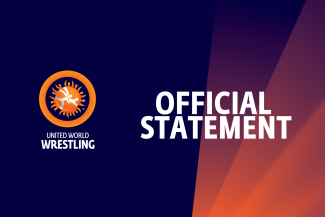Wrestling scores big at World C'ships with 706 percent jump in engagements
Tuesday, October 4, 2022 - 20:21 By United World Wrestling Press

CORSIER-SUR-VEVEY, Switzerland (October 4) -- Wrestling scored big both on and off the mat during this year’s UWW World Championships in Belgrade, Serbia, recording a staggering growth in viewership and engagement numbers digitally. Fans watched twenty-seven million minutes, close to 10 million page views on the mobile app, and a massive 706 percent jump in social media engagements in the last year.
The 2022 edition of the UWW’s flagship event, held September 10-18 was the first digitally-focussed World Championships. Special emphasis was laid on providing a high-quality fan experience that was easy to navigate and, at the same time, engaging to follow on the website, app, and various social media platforms. And the athleticism of the wrestlers drove the digital consumption, with wrestling recording impressive numbers across all platforms.
"The latest numbers from the World Championships show the importance of digitalization and with the current times, UWW is moving into the digital era," Nenad LALOVIC, UWW President, said. "The growth is reflected by the increased engagement across UWW’s new digital platforms and social media channels. This year's World Championships and the millions of fans who watched, interacted, or helped us grow, have laid the foundation for expanding the federation's digital potential."
Be it the UWW website, mobile app, the new streaming hub, or social media platforms such as TikTok, Facebook, Twitter, and Instagram, wrestling showed impressive year-on-year growth compared to last year’s World Championship on different metrics, such as social media growth, total views, total minutes and time spent on the web.
“We made the digital jump during these World Championships and the results validated our initial projections that now was the time more than ever to invest into a more robust digital experience across UWW platforms,” Gordon Templeman, UWW Commercial and Communications Director said. “There was tremendous benefit from a consolidation of tools that are more interconnected than ever before. We made an initial push in a short period of time and are optimistic for continued growth.”
Key highlights from the data analysis are:
* 27 million minutes were watched during the World Championship on the new video streaming hub, which gave the fans control of the viewing experience due to its multi-view option;
* The new UWW mobile app received 9.77 million page views and an average of 13 minutes and 46 seconds per session were spent, which is roughly equivalent to one bout. The high numbers meant the app topped the sports categories in app stores in key UWW markets;
* The total social media engagements surpassed 6.2 million in September, up by 706 percent since the 2021 World Championships.
Apart from these, the average time spent on the website grew by 41 percent to seven minutes, and the total page views across the website and mobile app were recorded at close to 19 million.
"Data is key to delivering digital experiences that fans want," Hisham Shehabi, COO, N3XT Sports, said. "Therefore, a diverse digital ecosystem helps augment fan intelligence capability. With 500 social media posts, millions in streaming viewership, and increased overall engagement, UWW's ability to customize the user experience has grown."
The massive growth is a direct consequence of the path-breaking steps taken by the UWW in the last few years under the leadership of President Lalovic. The UWW has identified and prioritized digital transformation as one of the five pillars for its 2022-2026 Strategic Plan, which was presented and approved at the 2021 UWW Congress.
UWW has taken several steps aimed at improving the fan experience and increasing the value to its partners to become future-proof and modernize further. A new mobile app was launched along with a video hub, which offered features like the multi-functionality view during the live streaming. This is one of the best examples of fan-led design and development as this was in direct response to the fans’ behavior while streaming.
“We focused our efforts on digital tools that would improve the competition for our fans and those at the competition. Launching an App, developing a video hub and putting in motion an audience database was a challenge, but the World Championships were too big of an opportunity not to start in this new digital direction,” said Sebastien Guenat, UWW Director of IT.
The 2022 World Championships also helped the UWW to establish itself as a true media and entertainment content house, creating more than 500 posts during the World Championships for use across its channels.
All these initiatives have helped the UWW establish a direct relationship with the fans and expand the digital footprint, as evident from the latest figures.


Share your thoughts.
Comments